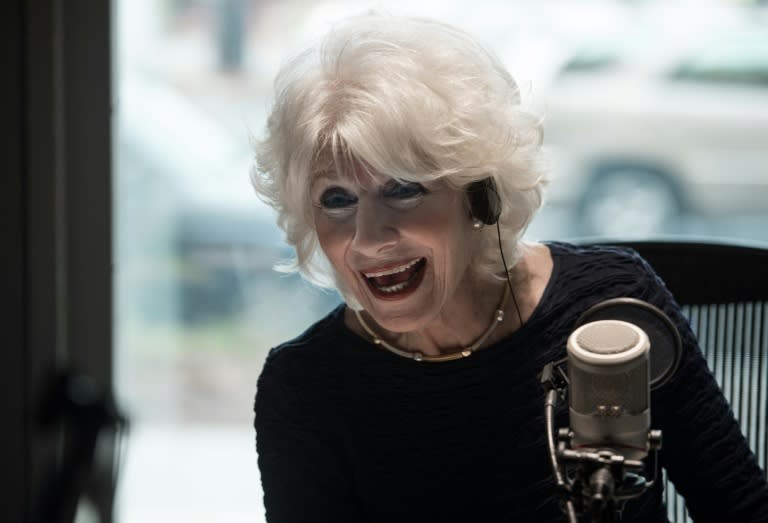Diane Rehm, 80-year-old radio star, hangs up the mic
She never went to college and a neurological disorder almost silenced her, yet Diane Rehm persevered to find her voice again as the celebrated host of one of America's longest running radio programs. Nearly four decades after stumbling into the radio business, Rehm is hanging up the mic on December 23 at the humble age of 80. "I am 1,000 percent ready to step away," she said in a wide-ranging interview with AFP at the offices of radio station WAMU 88.5 in Washington. "I was born in 1936, so why not? And I'm frankly tired of getting up at 5:00 am every weekday. I am really, really ready not to do that anymore." Rehm's guests have included top political leaders, actors and thinkers. More than two million people tune in every weekday to her eponymous live call-in program, distributed nationally by National Public Radio (NPR) and carried by some 200 stations. On January 2, it will be replaced by "1A," hosted by Joshua Johnson, co-creator of a radio series on America's troubled race relations. The first journalist to interview a sitting president -- Bill Clinton -- in the Oval Office, Rehm has received a slew of honors, including the prestigious Peabody Award. Her distinctive voice is halting and strained due to a condition known as spasmodic dysphonia. But Rehm is all steely determination, with hair blown out, red nails, and a navy blue dress hugging her slender body over knee-high black leather boots. "My spasmodic dysphonia came as a huge shock to me, something I thought would end my career," Rehm told AFP, recalling her 1998 diagnosis. "I feel extraordinarily fortunate that... listeners would accept such a flawed voice." To treat the disorder, Rehm gets Botox injections straight into her vocal cords three times a year, which takes her off the air for an average of 2.5 weeks. - Personal tragedy - The radio host dubbed a "national treasure" by her adoring fans has been open about the deeply personal hardships and struggles that have marked her life. Raised in a strict household by Syrian Christian parents who immigrated in the early 20th century, Rehm was molested when she was only nine years old, divorced her first husband after marrying at 19, and lost her second husband of 54 years to Parkinson's disease. "I'm just as human and have had as many failures as anyone else," said Rehm, who has written three autobiographies. Donald Trump's lewd boasts about groping women, which became public just weeks before last month's US presidential election, brought back "horrific memories" from a fateful day some 70 years ago. "For a president of the United States to say those things, and to brag about those things, and to have his supporters say it doesn't matter, shocks me more than I can tell you," she said. Rehm never even told her husband the name of her abuser, a congressman who had told Rehm's parents she had the makings of a "Hollywood star," before taking her to his hotel room and molesting her. "It was a terrible experience, a traumatic one in terms of the fear it generated in me in the years following," Rehm recalled. "I was afraid I might see him again, somehow, somewhere, and be taken away." Rehm's frankness about her personal hurdles sometimes caused friction with NPR's top brass. After her husband refused water, medication and food to end his painful battle with Parkinson's, Rehm became a vocal advocate for the right to choose to die, speaking at fundraising dinners for lobbying group Compassion & Choices. That eventually earned her a stern rebuke in February 2015 from NPR ombudsman Elizabeth Jensen, who said she had gone "a step too far." "It took my husband 10 days to die, and I felt that that was so inhumane, something we do not allow to happen to even the dogs or cats or horses or creatures we love," said Rehm, who plans on stepping up her activism after ending her show. - Trappings of the internet - When Rehm first volunteered for what was then a tiny local radio station in 1973, she was a stay-at-home mom with no broadcast experience. The host of the program was sick, and Rehm was thrust into her chair, asking tough questions of a representative of the dairy council -- for 90 minutes. Six years later, she began as full-time host of the program, which was renamed "The Diane Rehm Show" in 1984 and nationally syndicated in 1995. "I think the reason I've hit the mark that I have is because the questions I want answered are the same ones everybody else wants answered," she said. "They are not highfalutin, they are not so well educated or so well thought out; they are coming from my own curiosity." The venerated veteran faced one of the most difficult moments of her career during the recent presidential campaign when she was tricked by an internet rumor -- one of many in a campaign rife with untruths. In a June 2015 interview with Senator Bernie Sanders, who is Jewish and was then running for the Democratic nomination, Rehm told him he had dual citizenship with Israel and kept pressing him even after Sanders denied the allegation -- which stemmed from a listener's Facebook post. "I felt so terrible," Rehm said, taking "personal responsibility" for the incident that triggered accusations of anti-Semitism. "Check, check, check, check... that is the way you and I as journalists must be with the proliferation of these websites and this fake information that's out there."



